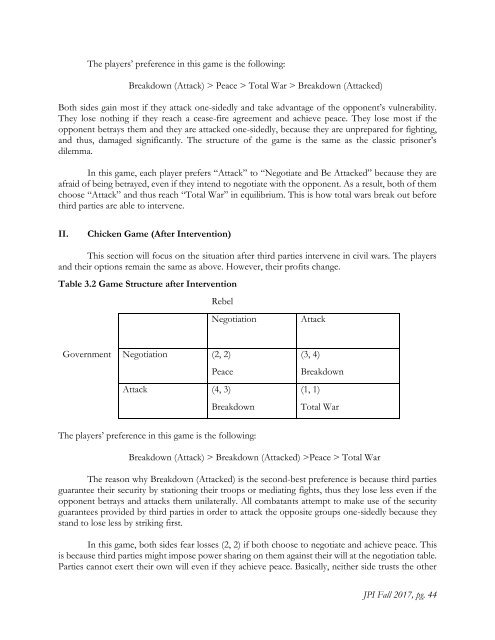JPI Spring 2018
You also want an ePaper? Increase the reach of your titles
YUMPU automatically turns print PDFs into web optimized ePapers that Google loves.
The players’ preference in this game is the following:<br />
Breakdown (Attack) > Peace > Total War > Breakdown (Attacked)<br />
Both sides gain most if they attack one-sidedly and take advantage of the opponent’s vulnerability.<br />
They lose nothing if they reach a cease-fire agreement and achieve peace. They lose most if the<br />
opponent betrays them and they are attacked one-sidedly, because they are unprepared for fighting,<br />
and thus, damaged significantly. The structure of the game is the same as the classic prisoner’s<br />
dilemma.<br />
In this game, each player prefers “Attack” to “Negotiate and Be Attacked” because they are<br />
afraid of being betrayed, even if they intend to negotiate with the opponent. As a result, both of them<br />
choose “Attack” and thus reach “Total War” in equilibrium. This is how total wars break out before<br />
third parties are able to intervene.<br />
II.<br />
Chicken Game (After Intervention)<br />
This section will focus on the situation after third parties intervene in civil wars. The players<br />
and their options remain the same as above. However, their profits change.<br />
Table 3.2 Game Structure after Intervention<br />
Rebel<br />
Negotiation<br />
Attack<br />
Government Negotiation (2, 2)<br />
Peace<br />
Attack (4, 3)<br />
Breakdown<br />
(3, 4)<br />
Breakdown<br />
(1, 1)<br />
Total War<br />
The players’ preference in this game is the following:<br />
Breakdown (Attack) > Breakdown (Attacked) >Peace > Total War<br />
The reason why Breakdown (Attacked) is the second-best preference is because third parties<br />
guarantee their security by stationing their troops or mediating fights, thus they lose less even if the<br />
opponent betrays and attacks them unilaterally. All combatants attempt to make use of the security<br />
guarantees provided by third parties in order to attack the opposite groups one-sidedly because they<br />
stand to lose less by striking first.<br />
In this game, both sides fear losses (2, 2) if both choose to negotiate and achieve peace. This<br />
is because third parties might impose power sharing on them against their will at the negotiation table.<br />
Parties cannot exert their own will even if they achieve peace. Basically, neither side trusts the other<br />
<strong>JPI</strong> Fall 2017, pg. 44
















